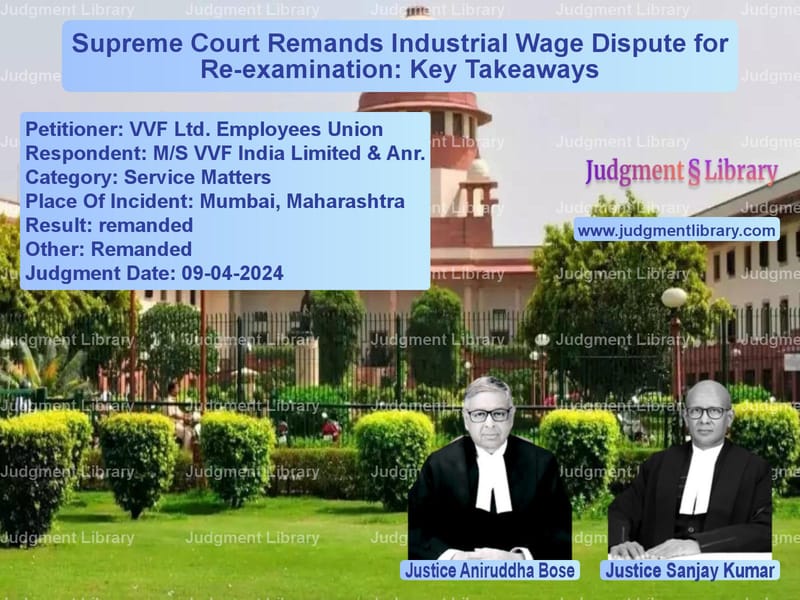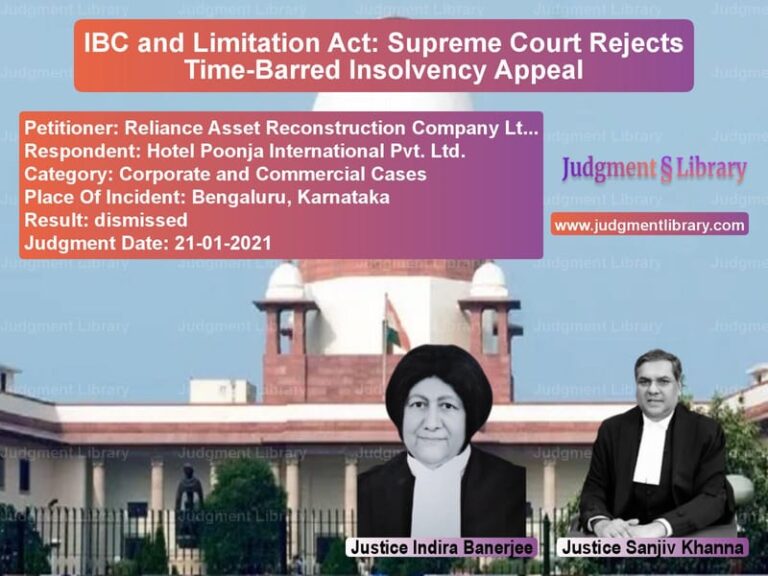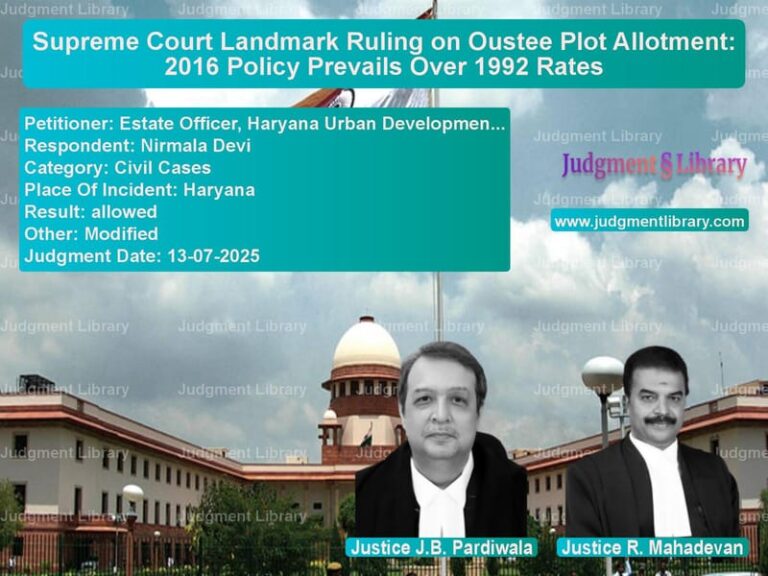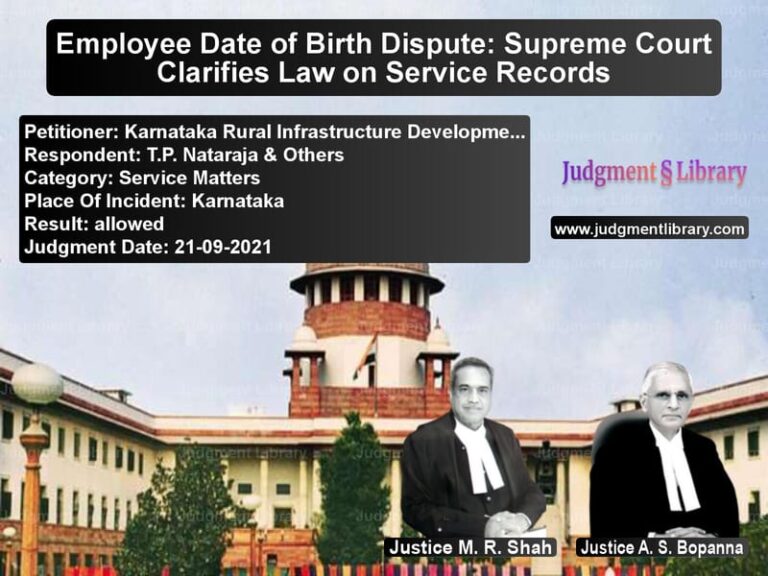Supreme Court Remands Industrial Wage Dispute for Re-examination: Key Takeaways
The case of VVF Ltd. Employees Union vs. M/S VVF India Limited & Anr. revolves around wage revisions, allowances, and other benefits for workmen employed at the units of VVF India Ltd. in Mumbai. The dispute originated from a charter of demands raised by the employees’ union in 2008, leading to a prolonged legal battle that culminated in the Supreme Court’s recent decision.
The case raises critical questions about the jurisdiction of courts in reviewing tribunal decisions, the industry-cum-region test for wage fixation, and the financial viability of wage revisions. The Supreme Court set aside both the Bombay High Court’s ruling and the Industrial Tribunal’s award, remanding the case for fresh adjudication.
Background of the Case
The employees’ union submitted a charter of demands on March 4, 2008, for 146 workmen employed at the company’s Sewree and Sion units in Mumbai. The demands primarily included:
- Revision of pay scales and salary adjustments.
- Increase in dearness allowance (fixed and variable).
- Enhancement of house rent, shift, medical, education, and travel allowances.
- Revisions in leave facilities, gratuity, and loan policies.
During the pendency of the case, VVF Ltd. underwent a demerger, and the Mumbai units came under VVF India Ltd. This change further complicated the legal proceedings.
Tribunal’s Decision
On March 29, 2014, the Industrial Tribunal granted partial relief to the workmen, approving certain demands:
- House Rent Allowance (HRA) increased to 20% of basic wages or Rs. 2,000 per month, whichever is higher.
- Shift allowance increased to Rs. 20 for the first shift, Rs. 30 for the second, and Rs. 50 for the third.
- Medical allowance set at Rs. 1,000 per month for workmen outside the purview of the Employees’ State Insurance (ESI) Act.
- Travel allowance increased from Rs. 600 to Rs. 800 per month.
- Education allowance fixed at Rs. 1,000 per month.
- Leave travel allowance granted at par with workers at the Taloja factory.
However, the tribunal rejected demands for basic pay revision, dearness allowance adjustments, and additional increments.
High Court’s Decision
Both the employees’ union and the employer challenged the tribunal’s decision in the Bombay High Court. The union sought a review of the judgment, arguing that its claims were not fully considered, while the employer contested the wage revisions and allowances.
The High Court ruled in favor of the workmen, setting aside the tribunal’s rejection of basic pay revisions and dearness allowance increases. The court justified its decision by applying the industry-cum-region test, comparing the wages at VVF India Ltd. with those at its Taloja unit and other companies such as Godrej Industries, Deepak Fertilizers, and Hikal Ltd.
Key Legal Issues
- Whether the High Court exceeded its jurisdiction in reviewing factual findings of the tribunal.
- Whether the tribunal correctly applied the industry-cum-region test for wage revision.
- Whether the employer’s financial condition justified rejecting wage hikes.
- Whether the High Court’s direct intervention in wage fixation was justified.
Arguments by the Employer
The employer, VVF India Ltd., opposed the High Court’s decision, arguing:
“The High Court exceeded its jurisdiction by substituting the tribunal’s findings with its own assessment of wage comparability. The court should have remanded the case instead of deciding factual issues itself.”
The employer also contended that its financial health did not permit wage hikes, citing continuous losses except in three financial years between 2008-09 and 2021-22.
Arguments by the Employees’ Union
The union supported the High Court’s ruling and argued:
“The High Court had the jurisdiction to intervene, as the tribunal failed to apply the industry-cum-region test correctly. The workmen at Mumbai were being paid significantly lower than their counterparts at the Taloja unit.”
The union also argued that overtime wages should be factored into wage revisions.
Supreme Court’s Analysis
1. Jurisdiction of the High Court
The Supreme Court ruled that while the High Court has broad powers under Article 226 of the Constitution, it should not have directly re-evaluated factual findings. The Court stated:
“The proper course would have been to remit the matter to the Industrial Tribunal rather than entering into these factual questions independently.”
2. Industry-Cum-Region Test
The Court acknowledged the significance of the industry-cum-region test but emphasized that such a comparison requires thorough factual analysis. The Court noted:
“The financial capacity of the employer is a key factor in wage determination, and the High Court should not have ignored VVF India Ltd.’s financial losses.”
3. Need for Remand
The Supreme Court found that the tribunal had not fully considered relevant factors and that the High Court’s intervention was inappropriate. It ruled:
“The matter must be reconsidered by the Industrial Tribunal to ensure a fair and evidence-based decision.”
Final Judgment
The Supreme Court set aside both the Bombay High Court’s judgment and the Industrial Tribunal’s award. The case was remanded to the tribunal for fresh consideration, with a directive to conclude the proceedings within six months.
Key Takeaways from the Judgment
- The High Court should not have engaged in fact-finding and should have remanded the matter instead.
- Wage revisions must be determined based on the industry-cum-region test and financial viability of the employer.
- The tribunal must re-evaluate the case while considering comparable industrial units and the employer’s financial condition.
- Overtime wages and other allowances should be reassessed based on industry standards.
Judgment Date: April 9, 2024
Judges: Aniruddha Bose, Sanjay Kumar
Petitioner Name: VVF Ltd. Employees Union.Respondent Name: M/S VVF India Limited & Anr..Judgment By: Justice Aniruddha Bose, Justice Sanjay Kumar.Place Of Incident: Mumbai, Maharashtra.Judgment Date: 09-04-2024.
Don’t miss out on the full details! Download the complete judgment in PDF format below and gain valuable insights instantly!
Download Judgment: vvf-ltd.-employees-u-vs-ms-vvf-india-limite-supreme-court-of-india-judgment-dated-09-04-2024.pdf
Directly Download Judgment: Directly download this Judgment
See all petitions in Employment Disputes
See all petitions in Pension and Gratuity
See all petitions in Recruitment Policies
See all petitions in Judgment by Aniruddha Bose
See all petitions in Judgment by Sanjay Kumar
See all petitions in Remanded
See all petitions in Remanded
See all petitions in supreme court of India judgments April 2024
See all petitions in 2024 judgments
See all posts in Service Matters Category
See all allowed petitions in Service Matters Category
See all Dismissed petitions in Service Matters Category
See all partially allowed petitions in Service Matters Category







